Our schedules become progressively hectic as we mature and attend college or start a family, with increased responsibilities, stress, and longer to-do lists. As we fall into the cycle of busy, frazzled adults, we may begin to have trouble falling asleep at night for either internal or external causes. Whether it’s our biology, stress-factors, diets, noise-factors, or we’re just uncomfortable at night, there is a natural way to tackle our sleep deprivation.
[the_ad_placement id=”in-text-1-type-r”]Once we educate ourselves on what influences sleep and how to improve it, we’ll learn how to sleep better using natural methods that can be found in our homes and pharmacies instead of in prescription drugs that can cause harmful side-effects.
Truths about sleep
In order to truly understand how any home remedies for sleep work, we must first understand more about why we need sleep, the “sleep clock” that’s buried in our biology, and the phases of sleep that are most important to our health. There are also hormones in our bodies that help regulate our sleep cycle, and understanding those can help us pinpoint whether we’re depleted in them or produce an excess.
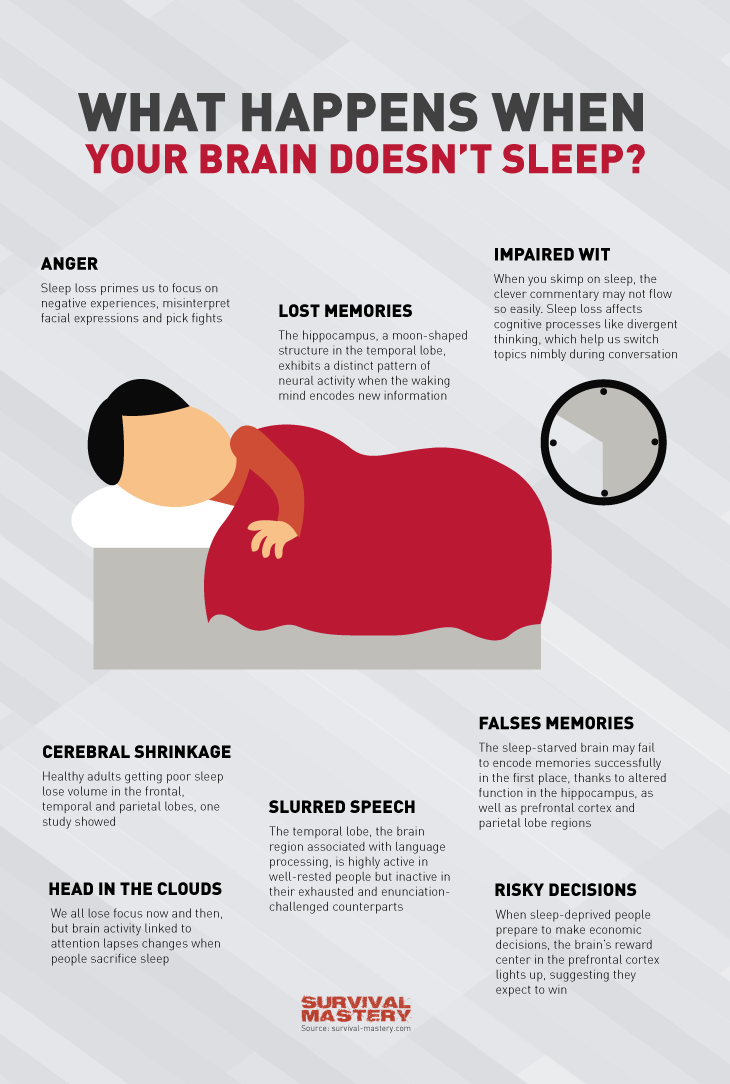
It’s also imperative we are able to track down the causes behind why we aren’t getting enough sleep, which is different for everyone of us, and what the ideal amount for each of us is. To really get to know our bodies and why sleep is important, let’s look at the many factors that contribute to a healthy sleep cycle.
Why we sleep
We spend about one third of our lives sleeping, yet scientists have failed to discover the true reason behind why organisms require sleep.

There are several contending theories, and each one may have truth behind them. Three theories exist that stand out and are accepted most:
- The first is the “inactivity theory” which states that we sleep in order to remain quiet at night and out of harm’s way. This is recognized largely by evolutionists as a way for organisms to stay alive in the night when it’s hard to see where we’re going and what predators lurk in the dark. In other words, sleep is a way to increase our survival at night.
- The second is “energy conservation theory” which states we sleep so we can conserve our energy for times when it is needed, such as when we hunt for food or work during the day. This may have been the case before our much-changed lifestyles that now allow us to simply buy food.
- Lastly, there is the “restorative theory” which simply suggests we are given time to rejuvenate ourselves during sleep. When deprived of sleep for an extended period of time, our immune systems cease to function correctly and we will die after just a few weeks. Also, muscle growth, protein synthesis, and tissue repair all happen while sleeping as opposed to being wakeful, supporting this thesis.
Circadian rhythm
Our bodies react to light, temperature and redox cycles that affect what’s known as our circadian rhythm. Our circadian rhythms can be defined as the mental, behavioral, and physical changes that occur within us over a 24-hour cycle that’s linked with the Earth’s rotation as we travel around the sun. It is linked with the rotation because of night and day – darkness and light.
When we are tired, we release a hormone called melatonin which tells our bodies that it’s time to sleep, thus making us sleepy. When light hits our eyes, our bodies release hormones that awaken us such as cortisol.
These hormonal changes can be genetic, but are vastly controlled by our environment and health. Without our circadian rhythm, we wouldn’t be able to properly regulate our sleep cycles, blood pressure, thirst and hunger cycles, recover from jet lag, have consistent menstrual cycles, etc.
Melatonin
Deeply connected with circadian cycles, melatonin is recognized for its role in slumber. When released in animals, it aids in sleep, telling the brain that it’s about time to crawl into bed. It’s released when darkness falls, having a connection with our optics. Melatonin can be bought at a pharmacy and taken in capsules to help aid in sleep or to help cure jet lag. When struck with a streak of insomnia or delayed sleep phase syndrome (DSPS), taking melatonin is usually suggested by doctors.
The sleep cycle
Ever heard Arnold Schwarzenegger’s famous quote that tells us to “just sleep faster” because all we really need is six hours of sleep? In a sense, he’s correct. Our bodies go through a cycle as we sleep with four different phases, one of which is extremely important in our nightly recovery. It can be sped up or slowed down, depending on our biology and hormones.
REM sleep or Rapid Eye Movement sleep has been shown in studies to be the period of our sleep cycle in which we gain the most benefit. Without it, our sleep is incomplete and we feel tired throughout the next day or unmotivated. REM sleep is when the most brain activity occurs and is believed to be the phase that is most restorative as well as when we have dreams. Awaking during REM sleep often causes us to feel overly tired and unprepared to wake.
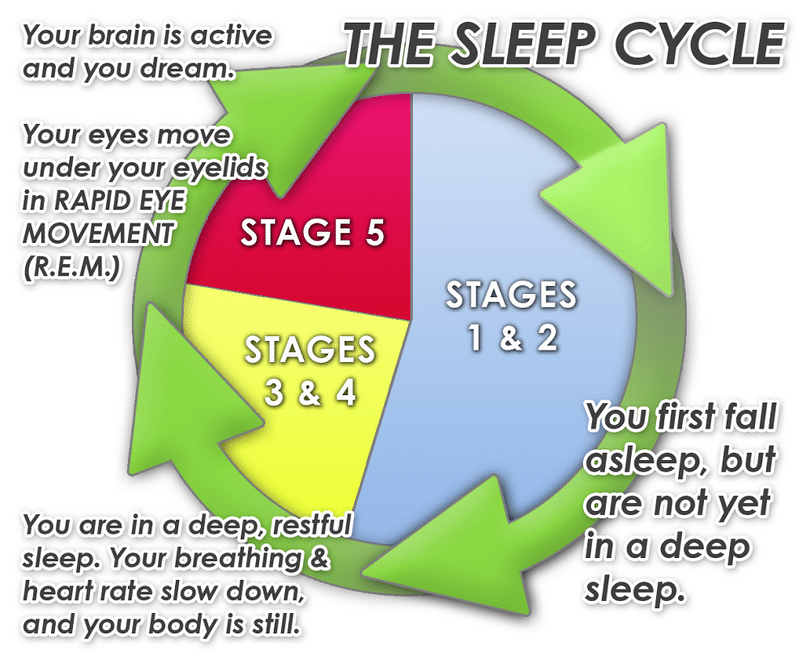
The REM stage of slumber happens after stage 1 (transition into sleep), stage 2 (light sleep), and stage 3 (deep sleep). Generally, it occurs between 70 and 90 minutes after falling asleep. This is when we dream, our heart rate and blood pressures increase, our breathing shallows, leg and arm muscles paralyze, and our eyes move rapidly from left to right – thus the name.
The following is a graphic of the stages of sleep we go through each night. Note that all four phases generally finish around 90 minutes, meaning that it’d be wise to set our alarm clocks at 90 minute intervals to ensure we aren’t waking during REM sleep and causing us to feel sluggish throughout our morning.
Knowing sleep deprivation
Sometimes, it’s hard to pinpoint all the symptoms of sleep deprivation. There are far more than many may think, and depriving our body of the sleep it needs will only have our health deteriorate faster. One of the easiest ways to improve the way we feel about sleep is simply getting a bit more – a few minutes can go a long way.
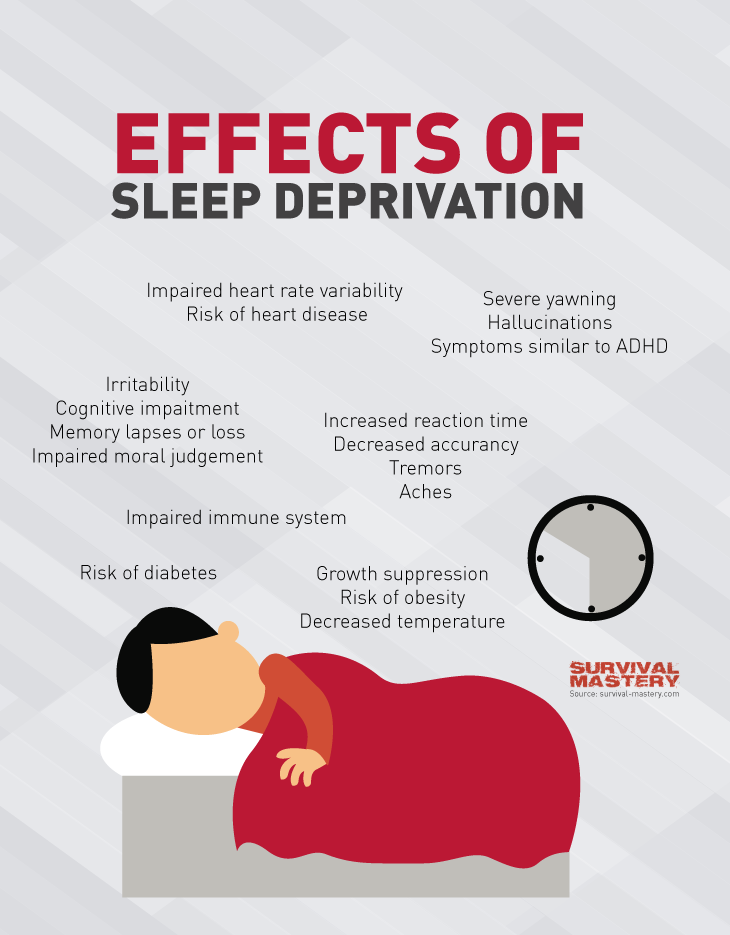
Our learning abilities, creativity, communication, work ethic, and overall health can all become affected by lack of sleep, divesting us of the rest needed in order to function correctly and optimally in any setting. If we need to increase our sleep, assure the amount is in segments of 90 minutes, so that we optimize our REM sleep and awake during a lighter phase of sleep. To spot whether or not we simply need more time spent in bed, consider the following points – all of which are signs that we’re experiencing sleep deprivation.
- Hitting the snooze button every morning, especially more than once
- Having a difficult time waking in the morning
- Feeling slothful once the afternoon occurs
- Warm rooms make you sleepy
- Becoming drowsy when driving or in meeting; lectures
- Needing a nap during the day
- Falling asleep while watching TV
- Sleeping extra on weekends
- Falling asleep within only a few minutes of crawling into bed
- Moodiness or irritability throughout the day
- Allow stress to overwhelm you
- Gaining weight
- Slower motor skills
- Problems concentrating or memorizing
- Less creativity/problem-solving abilities
Creating a proper sleep schedule
As stated above, REM sleep is extremely important when experiencing a full night’s rest. It is ideal for us to awake during either stage 2 or stage 3 of sleep, so structuring the amount of sleep we get in 90 minute segments is ideal.
If we feel sluggish in the mornings after eight hours of sleep and it’s hard for us to awake, hitting that snooze once or twice, try setting the alarm for seven and a half hours of sleep instead, waking during a different phase of our sleep cycle. Or, try for nine hours of sleep. Experiment with differing amounts of time of to see what improves our mood in the morning.
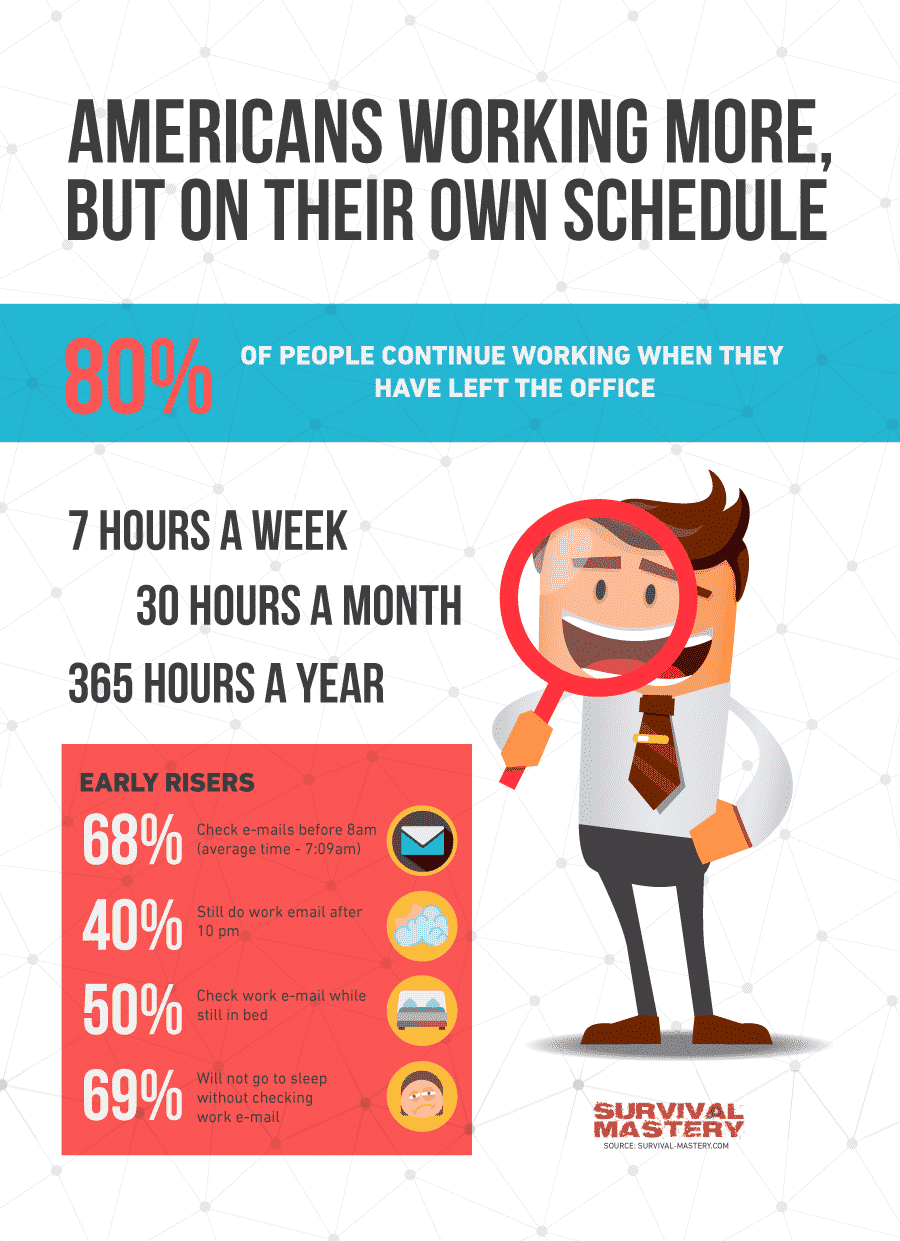
Also consider the time of day we are waking up. Does the light from the window tend to wake us up before our alarm? Do the chirping birds annoy us as we try to grab those extra minutes of needed sleep? If so, consider going to bed earlier. This way, we can awake earlier – with the sun and birds – as well as have a few extra minutes/hours in our morning to prepare for the day and get things done. This way, we’ll be aligning our circadian rhythm properly, with the arising sun, just as nature has intended us to wake.
Arising earlier in the day tends to create positive psychological changes as well: We are more prone to feel as if we can accomplish more, and often times, do.
Natural sleep remedies
Instead of going out to the pharmacy and buying some ZzzQuil or asking our doctor for a prescription drug to knock us out into dreamland, there are several other factors and methods we can consider that involve nothing more than that which our own home provides. When we aren’t getting the best sleep we could be getting, consider the following factors that all contribute to a healthy night’s sleep:
Reduce lighting
Our sleep cycle is affected by the amount of light our eyes register. Because of our circadian rhythm, we’re naturally programmed to want to sleep during the night. Therefore, our circadian rhythm recognizes light and darkness. When our bodies tell us they need sleep, darkness is needed for optimum quality. If light is present, even from a TV, bed lamp, or light from outside, our hormones become unbalanced.
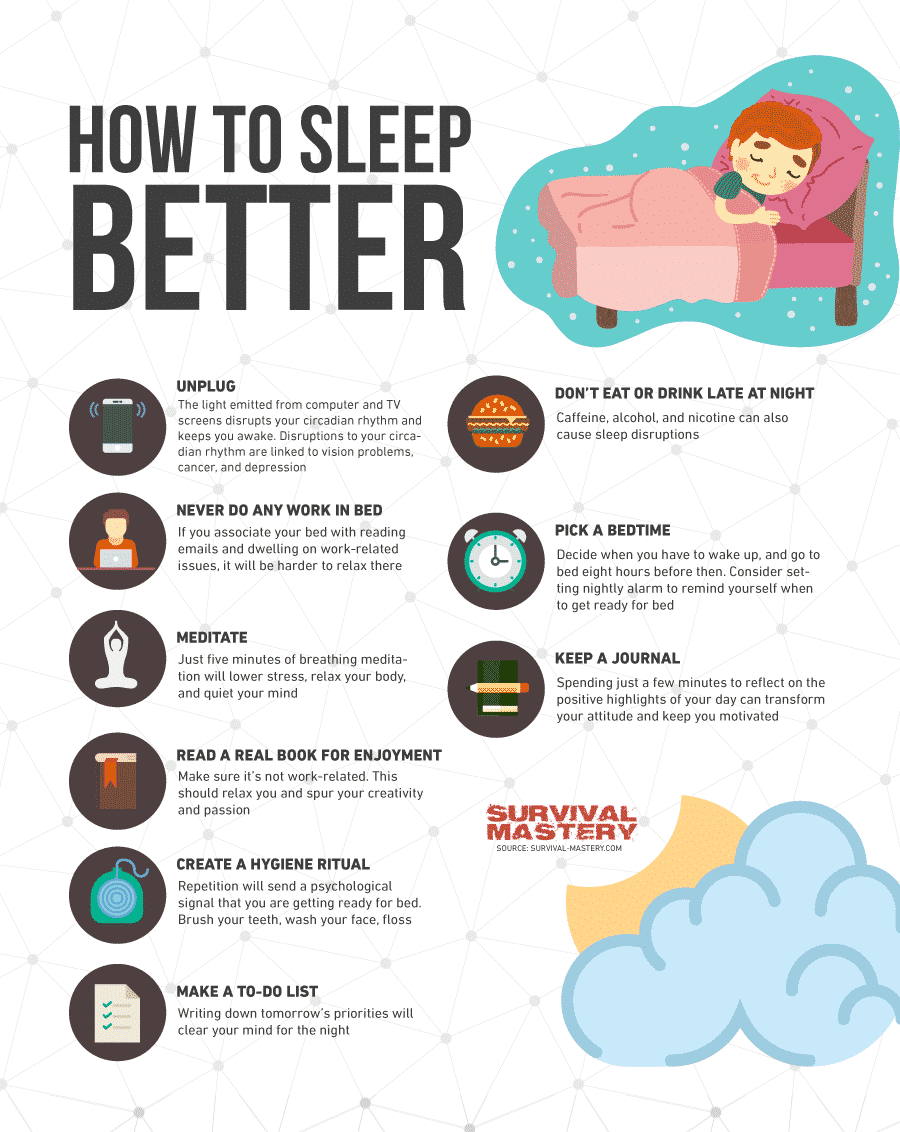
Melatonin is normally released for sleep when the eyes sense darkness. Cortisol is released when light hits our optics, stimulating the body to be awake. If light surrounds us when we try to sleep, the body has a difficult time deciding which hormone to release. Try to fall asleep in complete darkness, and if this isn’t possible, investing in an eye mask would be ideal.
Reduce sugar levels
We are what we eat, and what we eat affects our hormonal balances – even those associated with sleep. As stated above, cortisol, which is a stimulant, is the hormone released when we awake. Its levels are high in the morning and lower at night – when melatonin levels are higher. The cortisol in our system shifts according to the glycemic or sugar levels in our bodies. In other words, when our blood sugar levels rise, our cortisol levels rise too.
[the_ad_placement id=”in-text-2-type-r”]Eating sugary foods within five hours before bedtime can affect the amount of cortisol in our bloodstream, stimulating us, and making it harder for us to fall asleep. Ensuring our sugar intake is vastly reduced five hours before our bedtime will improve our slumber and make it easier to reach REM sleep.
See: Uses for Honey: In Survival, Medicine, And Beauty
Exercise 150 minutes per week
The National Sleep Foundation has released studies stating that at least 150 minutes or more of moderate to vigorous exercise per week increases the quality of sleep by 65%. Improving heart health and circulation not only will advance overall health, but also ensure our bodies sleep more sound. With better circulation, our brains can receive healthier amounts of oxygen as we sleep, causing its function and hormonal cues to balance better.
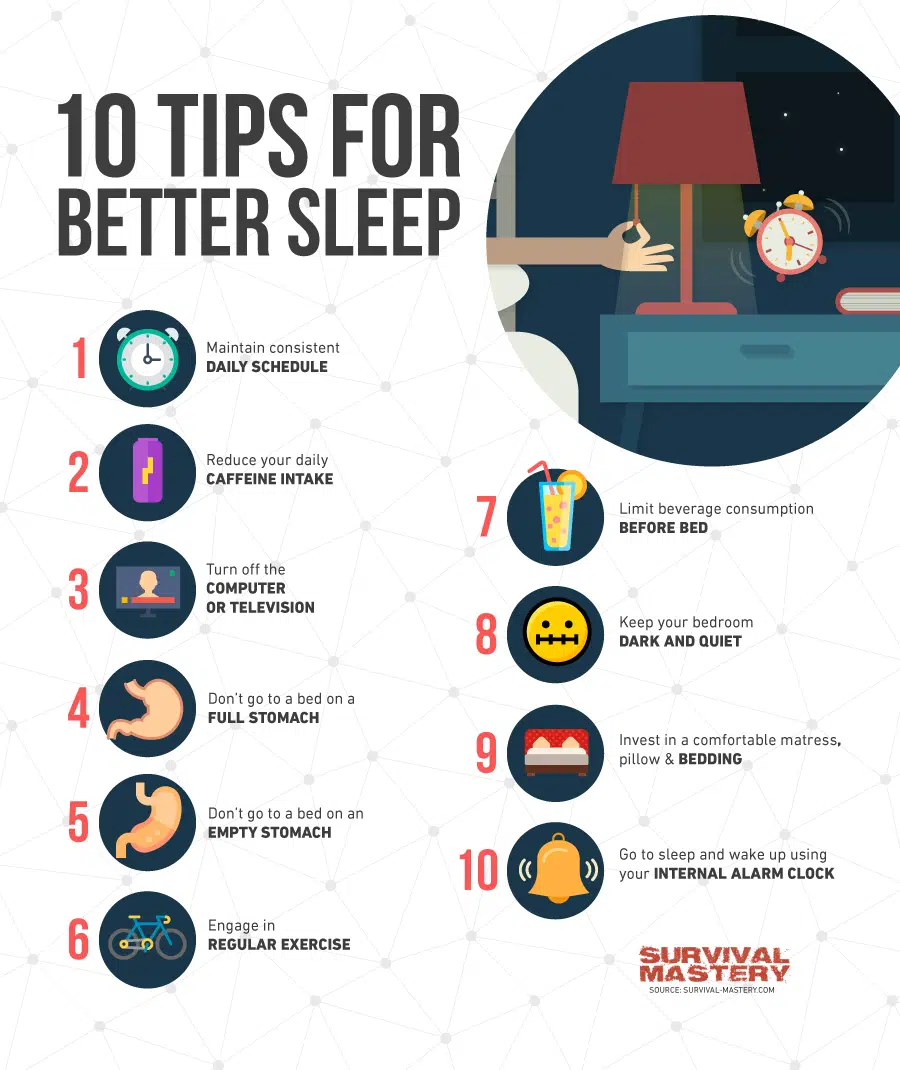
REM sleep improves as our bodies get the oxygen supply it needs to relax. After the initial boost exercise tends to give our bodies, our crash feels even sweeter when bedtime draws near as our muscles beg for a rest.
Vitamins/foods that improve sleep
Calcium and magnesium are the leading vitamins to improving sleep, and work well when taken together. Calcium levels increase in the bloodstream during REM sleep, making calcium deficiency a factor in the reduced quality of slumber. Magnesium has been proven through several studies to increase the quality of sleep, helping the body to relax and relieve tension within muscles (as well as in mood). Taken together an hour before bedtime, magnesium and calcium can improve the quality of our sleep naturally.
They can easily be found in pharmacies as pills, but for those of us seeking the more natural route – yogurt, kale, and collards are great alternatives to getting the needed calcium. Whole grains such as bulgur or barley contain the needed magnesium.

Melatonin can also be found at the pharmacy in capsules, and being the “sleep” hormone, taking one before bed will induce sleep faster. Tart cherry juice also has high levels of melatonin, if we’re seeking a more natural way to ingest it. However, taking melatonin will not vastly increase the quality of our sleep like calcium and magnesium – just the pace at which we fall asleep.
Vitamin B6 helps boost melatonin production, and can be found in various fish including tuna, salmon and halibut or even in bananas and chickpeas. Cereals also usually contain a good amount of B6, just check the label of your favorite fortified cereals.
Relaxing bedtime rituals
Apart from good food, healthy exercise, and balancing a schedule for ourselves, there are several other ways to improve our sleep that include the simple pleasures of relaxing ourselves both physically and psychologically.
Aromatherapy
Lavender has been proven in several studies to help aid sleep. Light a lavender candle or incense in your bedroom right before sleep, but be sure it’s in a safe location as to not cause any fires. If lavender doesn’t do it for us, try any smell that induces lethargy. Every person is different, and sometimes finding the right smell for me may not be the right smell for you. If lighting something on fire before bed doesn’t seem like a sound idea, using sprays on our pillows and sheets may be a better option.
Salt bath
Soaking it up in a steaming bath usually helps to induce a lovely sleep, especially when Epsom salt is added to the water. Epsom salt consists of magnesium and sulfate, which can help any inflammation in our muscles, relieving tension. As an added note, it also helps us to exfoliate, leaving our skin soft. See our must-read article on the benefits of epsom salt for more information on this important topic.
Drinking warm milk
Milk contains tryptophan, an amino acid that helps us feel sleepy. Drinking some before bed can help aid our decent into dreamland.

Drinking warm milk before bed isn’t an old wives’ tale for nothing!
Yoga
It’s normally looked down upon to exercise right before bedtime, since exercise increases our body temperature and stimulates us. However, light yoga before bed can help our muscles relax as we go through the stretches. Once finished, circulation is improved and sleep should come easier.
Meditation
Many of us fail to obtain quality sleep because we allow our minds to keep us awake. Stressful thoughts have a way of meddling with our slumber, but meditating before bed can help reduce the interference. Usually, guided meditations can help distract out minds to focusing in on the moment and releasing any negative thoughts that we dwell on.
[the_ad_placement id=”in-text-3-type-r”]They’re great to listen to in bed, and often, we fall asleep before the meditation is over causing us to fall into slumber in a relaxed state of mind. Instead of guided meditation, we can always choose to meditate on our own – whether its focusing on our breathing or counting sheep.
Avoid these habits before bed
Now that humanity has entered an age built around technology, it can be hard to figure out the little things that could possibly be affecting the quality of our sleep. With information at our fingertips, it can be easy to allow our thoughts to become side-tracked, increasing stress. Regard the following factors that could be decreasing the speed at which we fall asleep as well as the quality.
Electronic devices
Many of us are either glued to our phones, tablets, or TVs before bedtime. Avoid all light-emitting technology one hour before bed so our bodies can produce the sufficient amounts of melatonin needed to fall into a good night’s rest.

Also, don’t start text conversations later in the evening. Many times, a phone can go off with responses from friends and family if we try to start a conversation too late at night, awakening us.
Check e-mail
Checking our e-mail before bed will cause our minds to race with thoughts of the next day or what to say in a response. This is the opposite affect we want on our brains – so save checking e-mail for the next day.
Coffee/soda/caffeine
Although many enjoy a hot cup of coffee or soda with dinner, caffeine can stay in our systems for up to 12 hours, and being a stimulant, affect the quality of sleep or give us a light dose of insomnia.
No matter how big or small, coffee is coffee. Also no energy drinks before going to bed. And remember, many teas as well as chocolate also contain caffeine!
Eat fatty/spicy food
Spicy and fatty foods before bed can cause acid reflux, and the effects are increased when we lay on our back to sleep. Be sure to eat dinner several hours before bedtime to ensure digestion doesn’t interrupt your dreams.
Drink lots of water
It’s important to stay hydrated throughout the day, so we must ensure to drink our eight glasses of water – but not before bedtime. Chugging water before bed will cause us to get up and use the bathroom, which is never fun.

These simple remedies for improving our slumber can all be done at home – whether we’re trying a new bedtime ritual or eating healthy foods for dinner that will help us get a great night’s sleep. Understanding the sleep cycle and vitamins that aid it are important as we try new approaches, and we must remember to ensure our schedule is in balance with both our lifestyle and our REM sleep.
Exercise and nutrition are not only great for improving our health, but how well we sleep and recharge. As technology continues to improve and create distractions in our daily lives, we must learn how to push it aside before retiring to bed every night. Sleep is one third of our lives, and making sure we get the best quality we can, should be a top priority for us all.
For more facts on how much sleep your body needs, see our must-read article on this topic.






In particular, good quality sleep is very important for the people of intellectual labor. In the dream, their brains are not only resting, but also continue to find ways for solving complex problems, systematize and organize the accumulated information.
We all remember, for example, that Dmitry Mendeleev have got a sight of his periodic system of chemical elements in a dream, after many months of hard mental work.
Great advice, I guess. For those without kids. My daughter is 20 months old and I’m still alert at nights, sleeping lightly and it takes me a lot of time to get back to sleep if she’s waken me up by something.
As I got it from the article, my solution would be bulgur with kale and tart cherry juice for dinner :). But all jokes aside, I would really appreciate a technique that would let me relax and fall asleep quicker after waking up at night.
:) thank you Inna. However, when you have kids you are always on full alert which diminishes the quality of sleep. You will sleep better when your daughter gets a bit bigger and sleeps a bit more in one round.
I am having a lot of troubles sleeping regularly ever since I moved to an area with different climate. It is much hotter here in Arizona and I am not used to it, not even after a full year.
Any tips for solving this issue?